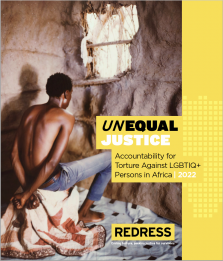This report sheds light on the violence and torture suffered by LGBTIQ+ people in Africa and the challenges that victims face to secure accountability for these crimes. It examines the situation in 11 countries in Africa – Algeria, Angola, Botswana, the Democratic Republic of the Congo, Ghana, Kenya, Malawi, Morocco, Mozambique, Uganda, and South Africa – but the findings of the research are equally applicable to other contexts in Africa.
While discriminatory violence can and often does amount to torture or other ill-treatment, the report finds that States often fail to confront or treat it as such. Many States in Africa afford little to no legal protection to LGBTIQ+ persons, whilst others criminalise same-sex conduct and fail to recognise the full spectrum of sexual orientations and gender identities. In recent years, there has also been a resurgence in legislation which targets, rather than protects, LGBTIQ+ persons. This has resulted in an increase in violence against LGBTIQ+ persons, while impunity remains the norm.
The report, which has a foreword by the UN Independent Expert on sexual orientation and gender identity, Víctor Madrigal-Borloz, outlines specific proposals to States, African human rights bodies, and civil society to improve the current situation.

